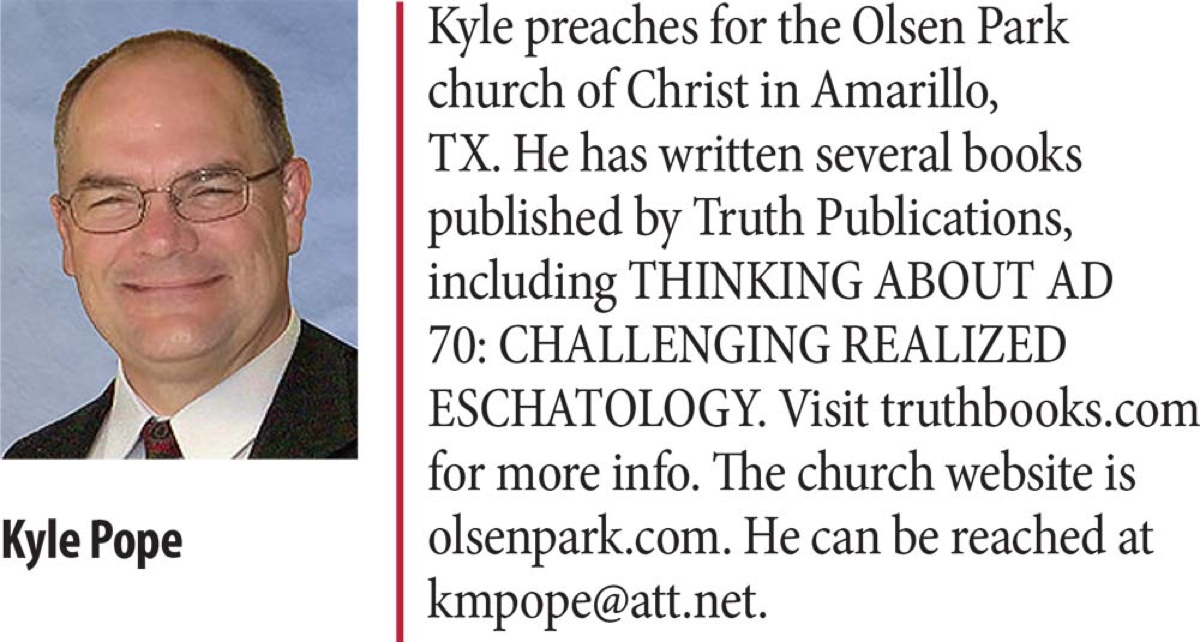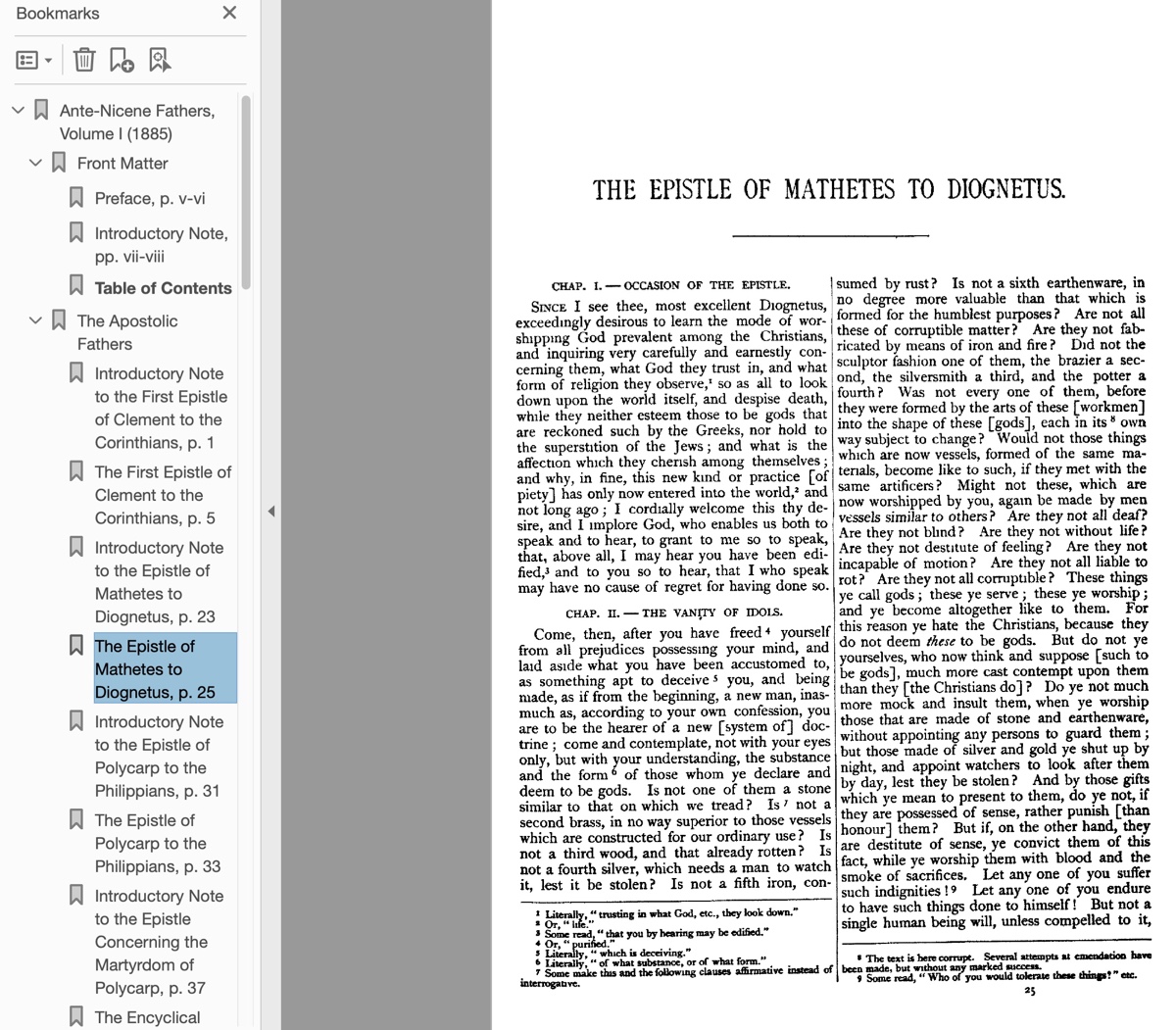by Kyle Pope
Synopsis: An ancient text, known as the Epistle to Diognetus, describes the remarkable distinction between early Christians and the pagan world in which they lived. If an account was written in our day, could we be described the same way?
The apostle John, in his first epistle, teaches an unusual relationship that should exist between Christians and the world. After asserting that Christ is the “propitiation” (NKJV) or “atoning sacrifice” (NIV) not only for Christians, but “for the whole world” (2:2), he moves quickly to charge believers not to “love the world or the things in the world” (2:15a, NKJV). A failure to do this, by possessing “the love of the world,” means the love of the Father is not truly within a person (2:15b). Going on to define “all that is in the world” and the various lusts that characterize it (2:16), the apostle makes the important declaration that this world “is passing away” (2:17a). This life, this age, this universe, this world was never intended to last forever—instead, it is “he who does the will of God” who “abides forever” (2:17b).
Halfway through the epistle, the apostle returns to this issue. He explains, “the world does not know us, because it did not know Him” (3:1). This is why the Christian should “not marvel” if “the world hates you” (3:13)—they hated our Master before they hated us. When we have “this world’s goods” we must open our hearts to those in need if God’s love is truly within us (3:17). “False prophets” (4:1b) and those with “the spirit of the Antichrist,” i.e., those opposed to Christ (4:3a) have gone out “into the world” (4:1c), and were “already in the world” (4:3b), making it vital for believers to “test the spirits” (4:1a). This should not discourage disciples of Christ, because “He who is in” them is “greater than he who is in the world” (4:4). The believer should not look like the world around him. It is unbelievers who “are of the world. Therefore, they speak as of the world, and the world hears them” (4:5). Christ’s entrance into this world had great meaning. He was sent “into the world, that we might live through Him” (4:9). Our faith affirms that God “the Father has sent” God “the Son as Savior of the world” (4:14). That calls us to live so that “as He is, so are we in this world” (4:17).
In his closing words, the apostle returns to the incongruity of the Christian in the world. He assures the faithful that the one who is “born of God overcomes the world” (5:4a). It is our faith that is “the victory that has overcome the world” (5:4b). Despite how it may often appear, the one who “believes that Jesus is the Son of God” is “he who overcomes the world” (5:5). This incompatibility between the Christian and the world is to be expected because “the whole world lies under the wicked one” (5:19). This is what the relationship between children of God and the world should look like. How are you doing at this?
In Constantinople, in 1436, a manuscript was discovered in the shop of a fish seller as it was being used to wrap fish. It turned out to be a 13th-century manuscript containing several Greek works written by the 2nd-century Christian apologist, Justin, and an otherwise unknown apologetic text written by an author identified only as “the disciple” (Gr. mathētēs) addressed to a man named Diognetus. It was first published in 1592 by Henri Estienne, the son of Robert Estienne (or Stephanus), the biblical scholar who published the edition of the Greek New Testament that came to be known as the Textus Receptus. Henri first classified it as an additional work by Justin, but over time scholars recognized it as the work of another unknown writer dated to the 2nd or 3rd century. Although this text is unmentioned in the writings of any known early church author, it came to be included in the collection of texts known as the Apostolic Fathers, comprised of the earliest Christian texts written immediately after the New Testament. It is a beautiful work written as an “apology” (i.e., an effort to persuade the reader of the wisdom of faith in Christ). It was written during a time of persecution and reflects concepts and principles taught in the New Testament and quotes Scriptures from it.
In the middle of the work, the author gives a concise description and explanation of the life of Christians and their relationship to the world. He explains:
For the Christians are distinguished from other men neither by country, nor language, nor the customs which they observe. For they neither inhabit cities of their own, nor employ a peculiar form of speech, nor lead a life which is marked out by any singularity. The course of conduct which they follow has not been devised by any speculation or deliberation of inquisitive men; nor do they, like some, proclaim themselves the advocates of any merely human doctrines. But, inhabiting Greek as well as barbarian cities, according as the lot of each of them has determined, and following the customs of the natives in respect to clothing, food, and the rest of their ordinary conduct, they display to us their wonderful and confessedly striking method of life. They dwell in their own countries, but simply as sojourners. As citizens, they share in all things with others, and yet endure all things as if foreigners. Every foreign land is to them as their native country, and every land of their birth as a land of strangers. They marry, as do all [others]; they beget children; but they do not destroy their offspring. They have a common table, but not a common bed. They are in the flesh, but they do not live after the flesh. They pass their days on earth, but they are citizens of heaven. They obey the prescribed laws, and at the same time surpass the laws by their lives. They love all men and are persecuted by all. They are unknown and condemned; they are put to death and restored to life. They are poor yet make many rich; they are in lack of all things, and yet abound in all; they are dishonored, and yet in their very dishonor are glorified. They are evil spoken of, and yet are justified; they are reviled, and bless; they are insulted, and repay the insult with honor; they do good yet are punished as evil-doers. When punished, they rejoice as if quickened into life; they are assailed by the Jews as foreigners and are persecuted by the Greeks; yet those who hate them are unable to assign any reason for their hatred. (Chapter 5: “The Manners of the Christians,” modified from the translation by Roberts and Donaldson, The Apostolic Fathers with Justin Martyr and Irenaeus).
How well would this description apply to saints today? Do we serve “as citizens” of our own country though living “as sojourners”? Do we live “in the flesh” without living “after the flesh”? Do we pass our “days on earth” while recognizing that we are “citizens of heaven”? Do we obey “the prescribed laws” while surpassing “the laws” in our lives? Although “poor,” do we “make many rich”? Do we repay “insult with honor”?
The Holy Spirit did not inspire these words, but they reflect the attitude of an early disciple of Christ who recognized the principles noted above. In the epistle as a whole, the author quotes from both John and Paul. We do not yet face the persecution that Christians such as this author experienced, but we live in a world that views us with contempt, bewilderment, or at the very least, misunderstanding. These words written centuries ago challenge us to see the special role we must play in our own world. Paul urged the Philippians to be “blameless and harmless, children of God without fault in the midst of a crooked and perverse generation, among whom you shine as lights in the world” (Phil. 2:15). He said, “For our citizenship is in heaven, from which we also eagerly wait for the Savior, the Lord Jesus Christ” (Phil. 3:20). If we penned an “apology” to persuade an unbeliever in our world to accept faith in Christ, could we describe our relationship to our world as this unknown Christian from long ago described Christians in his day? Jesus called us to be “the light of the world” (Matt. 5:14). May we faithfully fulfill the charge to “Let your light so shine before men, that they may see your good works and glorify your Father in heaven” (Matt. 5:16). May God help us to shine brightly in our world!
Roberts, Alexander, and James Donaldson. Ante-Nicene Fathers: The Writings of the Fathers down to A.D. 325. Volume 1: The Apostolic Fathers, Justin Martyr, Irenaeus. Revised by A. Cleveland Coxe. New York: Christian Literature Publishing Co., 1885. Available online at Semantic Scholar. https://oll-resources.s3.us-east-2.amazonaws.com/oll3/store/titles/1969/1333.01_Bk.pdf


